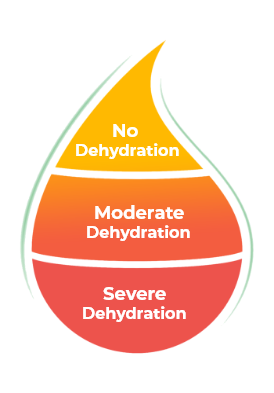

Usually acute diarrhoea is harmless, but it is important to take medical advice if you have severe, watery diarrhoea or frequent vomiting with major loss of fluids. This is recommended for the babies and toddlers; people with weakened immune systems; and especially elderly people because they often feel less thirsty, and may not drink enough water and as a result, they are at greater risk of dehydration due to not having enough fluids in the body.
The most severe threat posed by diarrhoea is dehydration. During a diarrhoeal episode, water and electrolytes (sodium, chloride, potassium and bicarbonate) are lost through liquid stools, vomit, sweat, urine and breathing. Dehydration occurs when these losses are not replaced.









Not enough signs to classify as moderate or severe dehydration